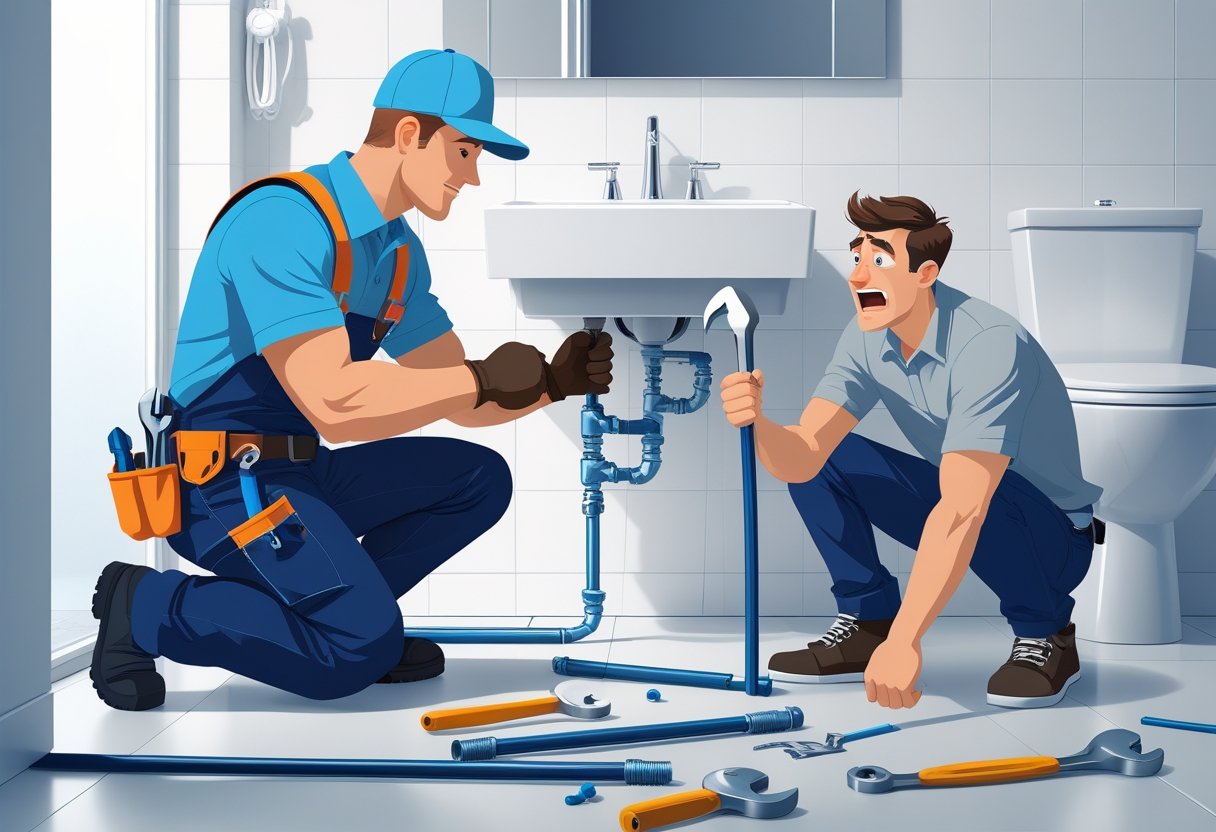Tackling home projects can feel rewarding, but it’s not always worth going solo. Hire a professional if a project needs technical skills, involves safety risks, requires following building codes, or demands tools and experience you just don’t have.
Deciding between DIY and calling in an expert affects your home’s value, your safety, and, honestly, how happy you’ll be with the results.

DIY projects can be fun and save money for simple updates. But once you get into electrical, major plumbing, or anything structural, things get complicated and risky fast.
Knowing your limits matters—for your safety and your budget.
Need a Home Fix – Emergency or Routine?
From leaks and no-heat nights to simple tune-ups, our 24/7 hotline connects you with trusted local pros in minutes.
Key Takeaways
- Bring in a pro for risky, specialized, or code-required projects.
- Think about your skills, the project’s complexity, and possible safety issues before you dive in.
- Getting real about your limits helps you get better results and skip the headaches.
Key Factors for Deciding Between DIY and Hiring a Professional

Choosing between DIY and hiring a pro depends on your experience, how complicated the job is, the tools you’ll need, and whether saving money is worth the extra effort.
Assessing Your Skills and Experience
Start by asking yourself if you’ve handled similar projects before. If you often do basic repairs and feel confident, you might be fine with painting, installing shelves, or simple tiling.
For anything like electrical wiring or plumbing, you need more than enthusiasm—you need training and a clear understanding of code. Lack of experience here can lead to mistakes that cost you time, money, or even your safety.
Think about how much you’d have to learn before starting. If it feels like too much, it’s probably smarter to hire someone. DIY is great for small stuff, but for big knowledge gaps, let the experts handle it.
Understanding Project Complexity
Complexity really matters. Swapping cabinet hardware or caulking a tub? That’s straightforward, usually safe, and you can follow instructions online.
Bigger projects—like structural repairs, roofing, or full room remodels—often need permits and must meet building codes. These jobs demand technical skills and an understanding of legal requirements.
Ask yourself: If you mess up, will it cost a lot to fix, hurt your home’s value, or put anyone at risk? If yes, that’s a big red flag for DIY. And let’s be honest, learning as you go can drag out the timeline way longer than you expect.
Evaluating Equipment and Tools Required
Some jobs only need tools you already have. Others require stuff like tile cutters, drywall lifts, or heavy-duty saws—things most people don’t own.
Renting or buying tools adds up fast, and there’s always a learning curve. Using the wrong tool, or using it wrong, can lead to accidents or shoddy results.
Make a list of what you’ll need. If you don’t have the gear or don’t want to risk it, professionals are worth it just for their equipment and know-how.
Cost Comparison: Saving Money Versus Labor Costs
DIY often looks cheaper because you skip labor costs. But don’t forget materials, tool rentals, or the price of fixing mistakes.
Here’s a quick breakdown:
| Cost Element | DIY Project | Professional |
|---|---|---|
| Materials | You buy | Typically included or marked up |
| Tools/Equipment | May need to purchase/rent | Brought by pro |
| Labor | Your time | Charged hourly or by project |
| Corrections/Repairs | Possible extra cost | Usually covered by warranty |
Time matters too. If a DIY project will drag on or disrupt your life, paying more upfront for a pro might actually save your sanity. Always get quotes and think through every possible cost before you decide.
When to Hire a Professional for Home Projects

Some projects just aren’t safe or legal to do yourself. Professionals have the training, licenses, and equipment to get these jobs done right.
Safety Risks and Hazardous Materials
If a project involves hazardous materials—think mold, asbestos, or pest infestations—call a pro. Exposure to things like mold spores or asbestos can seriously mess with your health. Licensed contractors have the gear and know-how to handle it safely.
Roof work or anything involving heights is risky too. Falls are a top cause of home repair injuries. Pros use safety harnesses and the right techniques, so if your health is on the line, don’t risk it.
Projects Involving Plumbing, Electrical Work, or Gas Lines
Plumbing, electrical, and gas work are some of the most heavily regulated jobs for a reason. Mistakes here can cause water damage, fires, or explosions. Most areas require a licensed professional for these tasks.
Bad electrical work can cause shocks or outages, and gas leaks are outright dangerous. Certified pros know how to spot and fix problems before they get worse.
Sure, you might swap out a faucet or a light fixture if you know what you’re doing. But for major repairs or new installs, don’t mess around—hire a licensed expert.
Structural Changes and Building Code Compliance
Changing your home’s structure—like taking out walls or adding rooms—absolutely needs a pro. Mistakes here can compromise the whole building. General contractors know how to reinforce structures and meet code.
Building codes cover everything from ceiling height to stairs for safety. Contractors handle permits and make sure your project passes inspection, which protects your home’s value. Navigating permits alone is a headache most people don’t want.
Trying structural projects solo can lead to failed inspections, fines, or an unsafe home. When you’re unsure, it’s always safer to talk to an expert first.
Managing Complex Renovations and Major Repairs
Large-scale home renovation projects—think bathroom remodels, whole-house painting, roofing replacement, or even landscaping overhauls—demand coordination across a bunch of trades.
General contractors and subcontractors juggle schedules and deal with unexpected problems. They bring the specialized skills each task needs.
Big repairs or renovations usually reveal hidden issues, like water damage, termite infestations, or outdated wiring. Only trained professionals can spot and fix these problems the right way.
Hiring through platforms like Thumbtack can make things smoother and help keep your project on track and under budget.
Honestly, complex jobs need some real experience with budgeting, logistics, compliance, and quality control. Trusting a pro often saves you from mistakes that could end up costing way more than just hiring them in the first place.







Leave a Reply